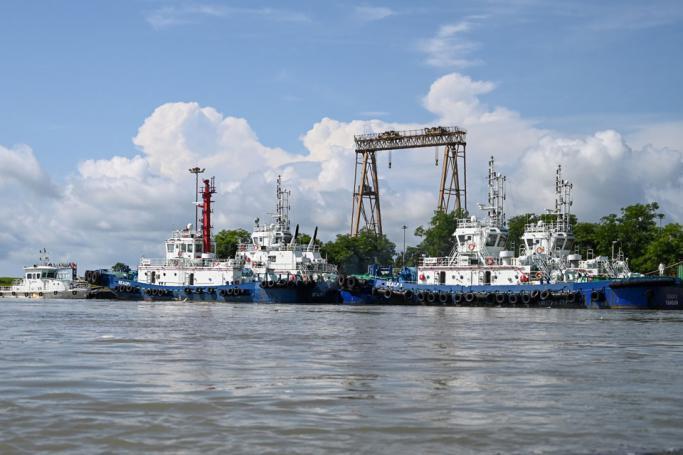The dragon has got its claws on Myanmar, a country suffering diplomatic isolation following the February 2021 coup, backing the military junta in its bid to bleed the nation dry of natural resources.
China rushed in as a knight in shining armour to shield Myanmar, beset by a global boycott and turmoil following the overthrow of the legitimate elected civilian government of Aung San Suu Kyi. However, such a saviour’s act seldom comes for free.
Welcome to the brazen new world of neo-colonialism!
China eyes feeding on Myanmar’s natural resources for economic gain. History testifies to how the dragon had earlier taken successive military dictators under its wings since the 1962 coup when General Ne Win seized power.
Coups and crises in Asia offer a window of unique opportunity for China. Yet one only has to look at how Sri Lanka fell foul of a Chinese debt-trap to understand where things can go wrong.
China stepped in to Myanmar at an opportune time. The military coup precipitated chaos that snowballed into political and economic crises in Myanmar. Poverty reigns supreme with a high rate of unemployment and flight of foreign firms adding insult to the injury. The Myanmar military regime was blocked from attending ASEAN meetings for its failure to implement an agreed five-point consensus put forward by the organisation.
Solidarity Show
So, how did this new cozy relationship with the looming dragon develop? Xinhua, China’s official news agency, was quick to clear the decks for legitimising Myanmar’s authoritarian regime by branding the coup as a “cabinet reshuffle”, even as the military junta was globally put in the docks. A totalitarian system dovetails with the Chinese dispensation of governance that had no qualms about orchestrating the Tiananmen Square massacre in 1989. Arbitrary periods of military dictators have come in handy for China to reap maximum benefits.
The Myanmar generals have bartered natural resources, including gas, timber, jade and copper, with China for its diplomatic support and investments. Consequently, China obtained massive gas fields and land for the Kyaukphyu port and the SEZ in Rakhine State for free.
Paradoxes dominate the Chinese scheme of things, especially in what it preaches and practices. The dragon, the apostle of development, chooses to take underdeveloped nations for a ride and later arm-twists them into making diplomatic and economic concessions. In the case of Myanmar, its much-touted “Socialism with Chinese characteristics” translates into actuality as “Capitalism with socialist characteristics” wherein maximisation of profit displays a reckless disregard for humanity at large. There is little doubt that China clamours to solve Myanmar’s problem only to serve its own ends.
China continues with its ambitious Belt and Road Initiative (BRI) through Myanmar, with a view to effecting economic and military domination in the Indian Ocean. Only Myanmar could give China the access to both the Indian Ocean and the Pacific to fend off its perceived encirclement of its borders.
As a result, the development of the China Myanmar Economic Corridor (CMEC) is going on full swing. The project envisages building a transport corridor comprising roads, railroads and economic special zones from Kunming in China’s Yunnan province to Myanmar’s west coast. It includes a deep-sea port as part of the BRI in Kyaukphyu, to which the junta is extending much-needed assistance. The passageway will be a substitute to the Malacca Strait, which is currently under US military dominance. The sea route is vital to China as it accounts for 80 per cent of the import of oil and gas into the country. It is not a stretch to imagine that the Kyaukphyu deep-sea port could double up as a site for the future deployment of the Chinese Navy.
Bigger Gains
What has kicked off with economic exploitation is poised to serve China’s geopolitical and security interests in the future, by keeping a close tab on the shared border with India and Thailand. Establishing stability across the border would also augur well for Chinese business by monitoring the clashes among some of the ethnic armies in the contested Chinese border regions. This would eventually guarantee secured access to the Indian Ocean.
China, in the recent past, has been able to put into operation the shipping route linking the new Beibu Gulf Port in Guangxi Province in the South China Sea to Yangon. China is also laying more stress on progressing with the industrial development zone on the border of Shan State and Kachin State, and will accept the presence of United Wa State Army (UWSA) in the region.
Let’s not forget that history has a peculiar way of repeating itself when a blind eye is turned willfully to the lessons offered by it. While attending to its short-term need to counter worldwide condemnation, Myanmar is gradually falling prey to China’s long-term machinations.
After Sri Lanka, Myanmar looks set to gain a dragon eye.
Roland Tatum is the pen name for a writer who covers Asian affair












